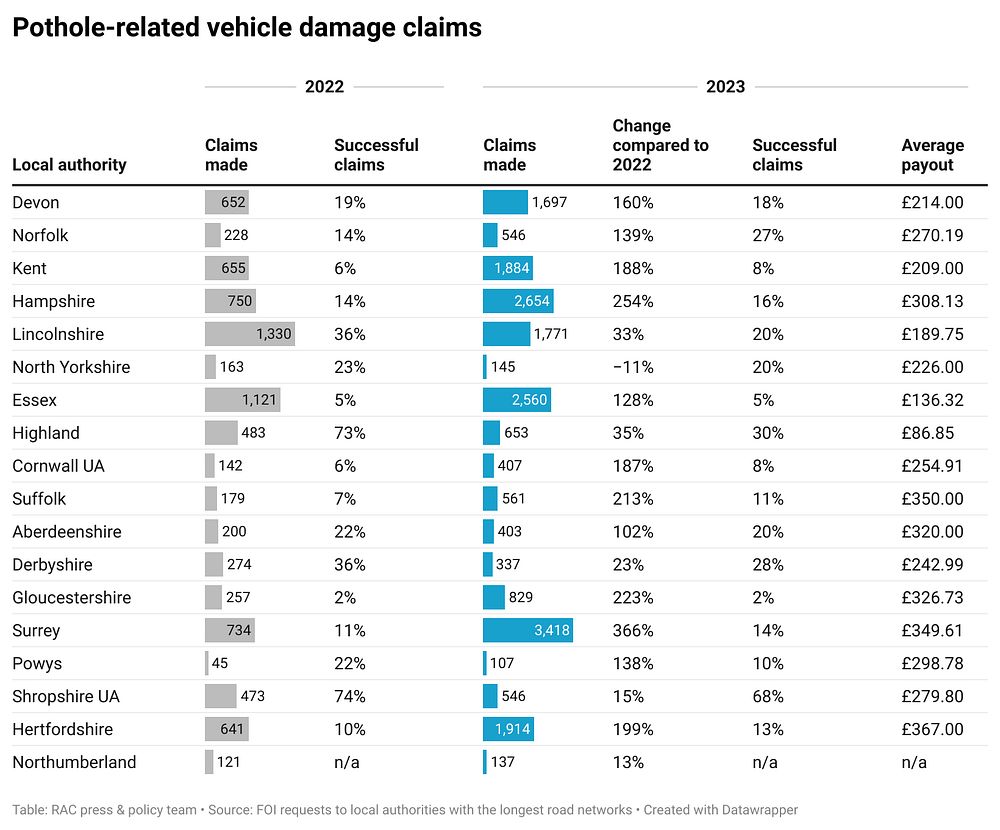Pothole damage claims more than doubled in 2023 but the vast majority are contested by councils and are unsuccessful.

In 2023, there were 20,432 pothole compensation claims submitted to 18 local authorities with the longest road networks – more than double the figure of 8,327 for 2022, according to analysis by the RAC.
Its Freedom of Information request to 21 councils – covering nearly 92,200 miles of local roads – found that of the 18 that responded, Surrey County Council saw the biggest increase in claims, from 734 in 2022 to 3,418 in 2023.
Hampshire County Council was a close second, where claims jumped from 750 in 2022 to 2,654 last year, followed by Gloucestershire County Council, where claims rose from 257 in 2022 to 829 in 2023.
But 17 councils paid out just 15% of all compensation claims received in 2023. And of these councils, 13 refused more than three-quarters of the claims they received.
What’s more, five councils refused nine out of 10 pothole claims in 2023.
Gloucestershire County Council refused 98% of its 829 claims; Essex County Council refused 95% of its 2,560 claims; Kent and Cornwall Councils both refused 92% of their 1,884 and 407 respective claims and Powys County Council refused 90% of its 107 claims.
Only Shropshire Council paid more than 30% of the compensation claims it received, paying 68% of its 546 claims in 2023.
The numbers also show that as pothole damage claims have increased, the proportion of claims refused by councils has risen slowly too. Between 2021 to 2023, the average number of claims refused has risen by five percentage points, from 76% to 81%.
The FOI data also shows the majority of claims are refused on the grounds that the council was not aware of the existence of the potholes in question, under Section 58 2d of the Highways Act 1980.
Of the 8,172 compensation claims refused by the nine councils that provided data for this question, an overwhelming majority – 74% (6,028) – were refused on Section 58 grounds.
Gloucestershire and Hertfordshire councils both stated that every single claim (100%) they refused was because they did not know that a particular pothole existed.
RAC head of policy Simon Williams said: “We strongly urge drivers to inform councils about any potholes they are aware of, either via the RAC’s website or using the free Stan app, which collects data on the state of UK roads.”
The results also show that 13 of the 18 councils that provided Freedom of Information data to the RAC paid out more than £166,000 in legal fees to defend pothole claims from drivers last year.
Lincolnshire County Council spent nearly £96,000 defending itself against some of the 1,771 pothole claims it received in 2023. Devon County Council was the second biggest spender, although at a much lower fee of £33,232, while Essex County Council spent almost £20,000 (£19,685). The fee total then drops below £10,000 for all other authorities.
RAC’s Simon Williams said the findings show that the nation’s beleaguered local roads are “burning holes in the budgets of both local authorities and drivers”.
He also noted that while some councils appeared to prioritise paying legal fees over settling pothole claims, the cost in time and money of defending claims appears to far outweigh the expense of reimbursing drivers for the damage done to their vehicle in the first place.
“Even if a driver successfully pursued compensation, the average sum paid out of £260 is often well below the cost to fix a pothole-damaged car, for anything more serious than a punctured tyre,” Williams added.
The figures could be the ‘tip of the iceberg’ too, as almost the same number of councils refused to tell the RAC why they threw out pothole claims compared to those that did.
The RAC added that local authorities need greater certainty of funding to tackle the root cause of the UK’s pothole plague and said the extra £500m pledged in the Autumn Budget for road maintenance in the next year was sorely needed.
“It’s vital that this money is used by councils not to merely fill potholes, but to carry out preventative maintenance – through surface dressing roads at regular intervals to stop roads falling apart in the first place. Roads that are beyond reasonable repair should be resurfaced,” Williams stated.
The National Audit Office’s 2024 report found that local roads in England are getting worse, with fewer roads being maintained. Pothole-related breakdowns and other incidents are on the rise, according to the report, with RAC patrols attending nearly 30,000 pothole-related breakdowns in 2023, up by 33% compared to 2022.


